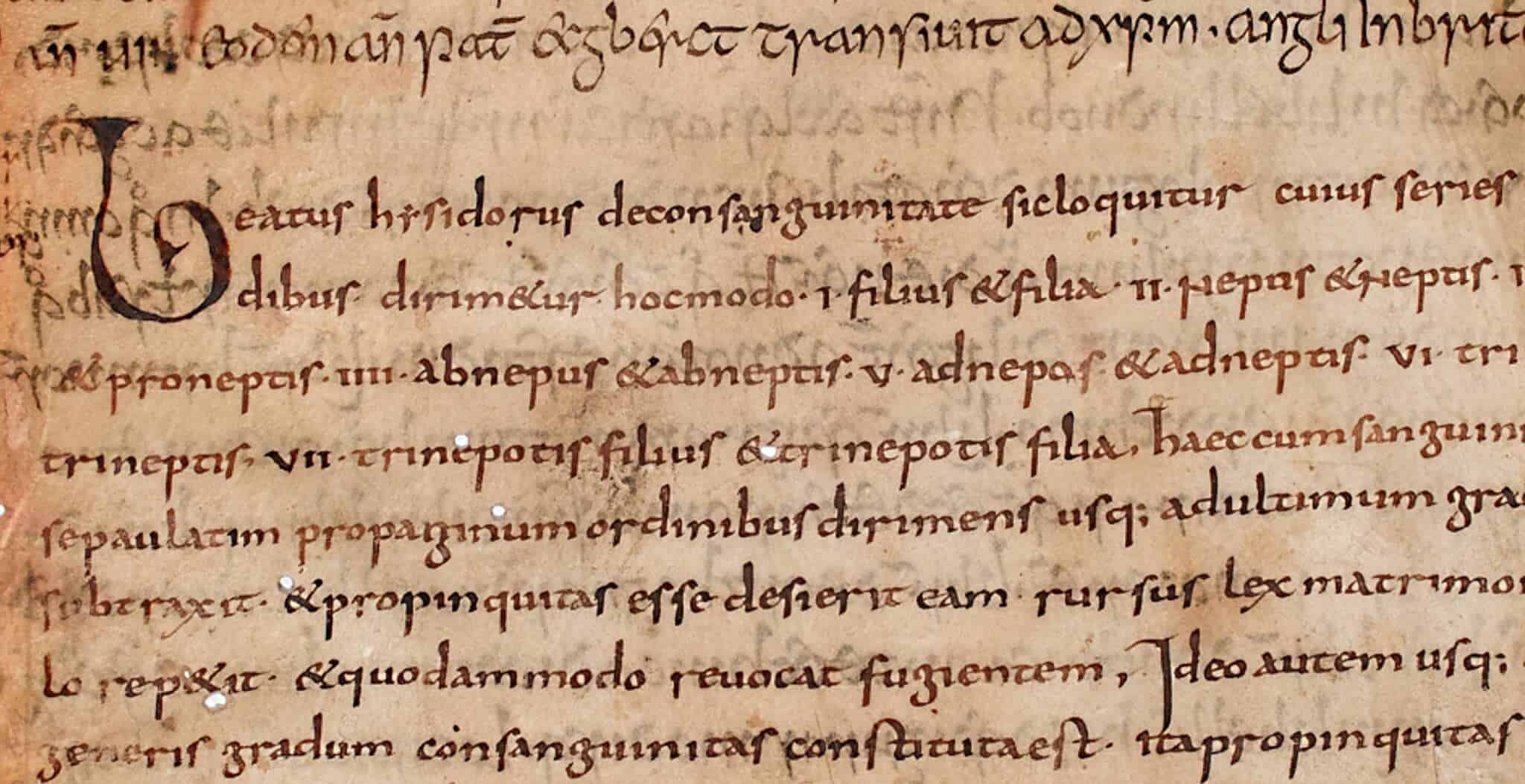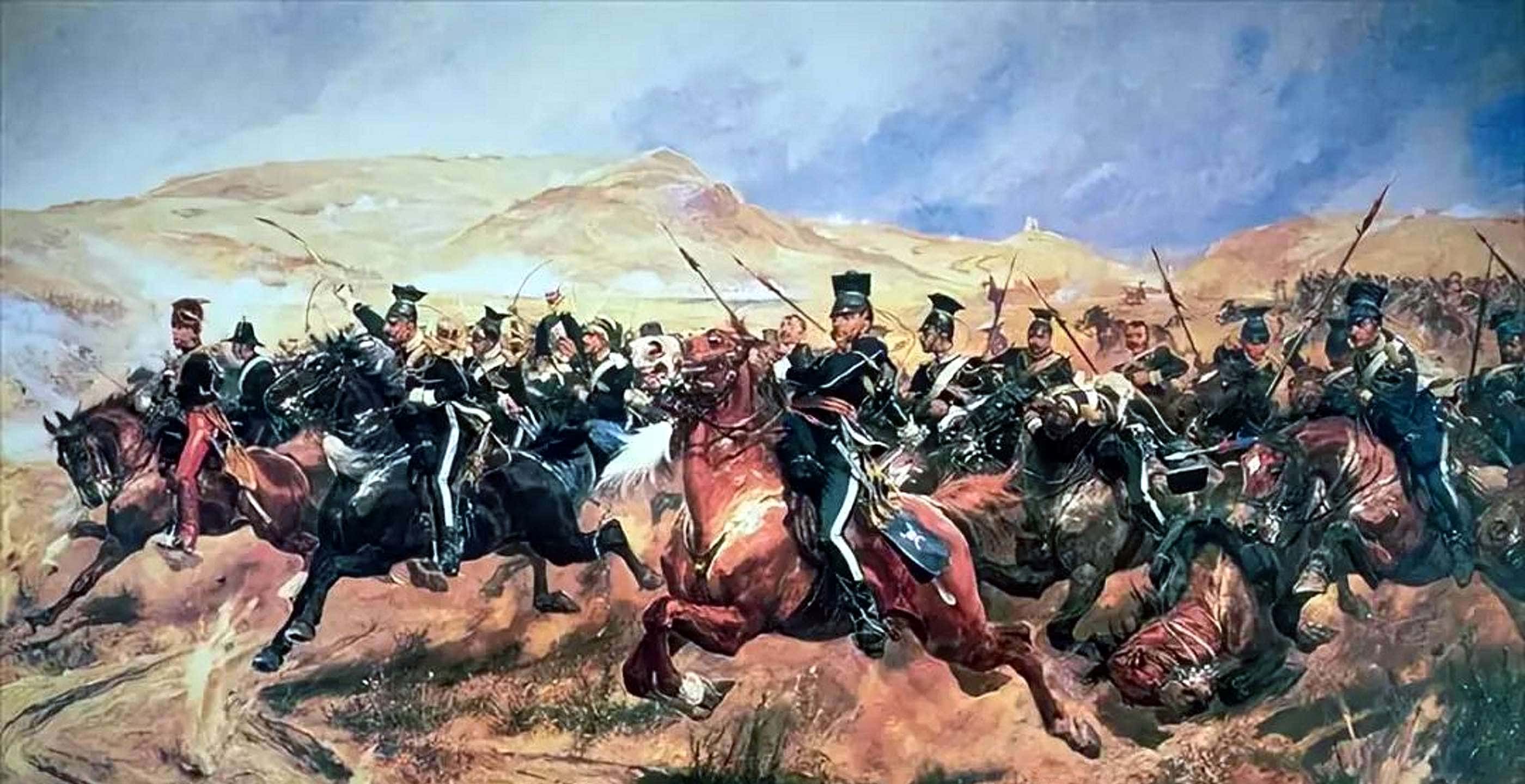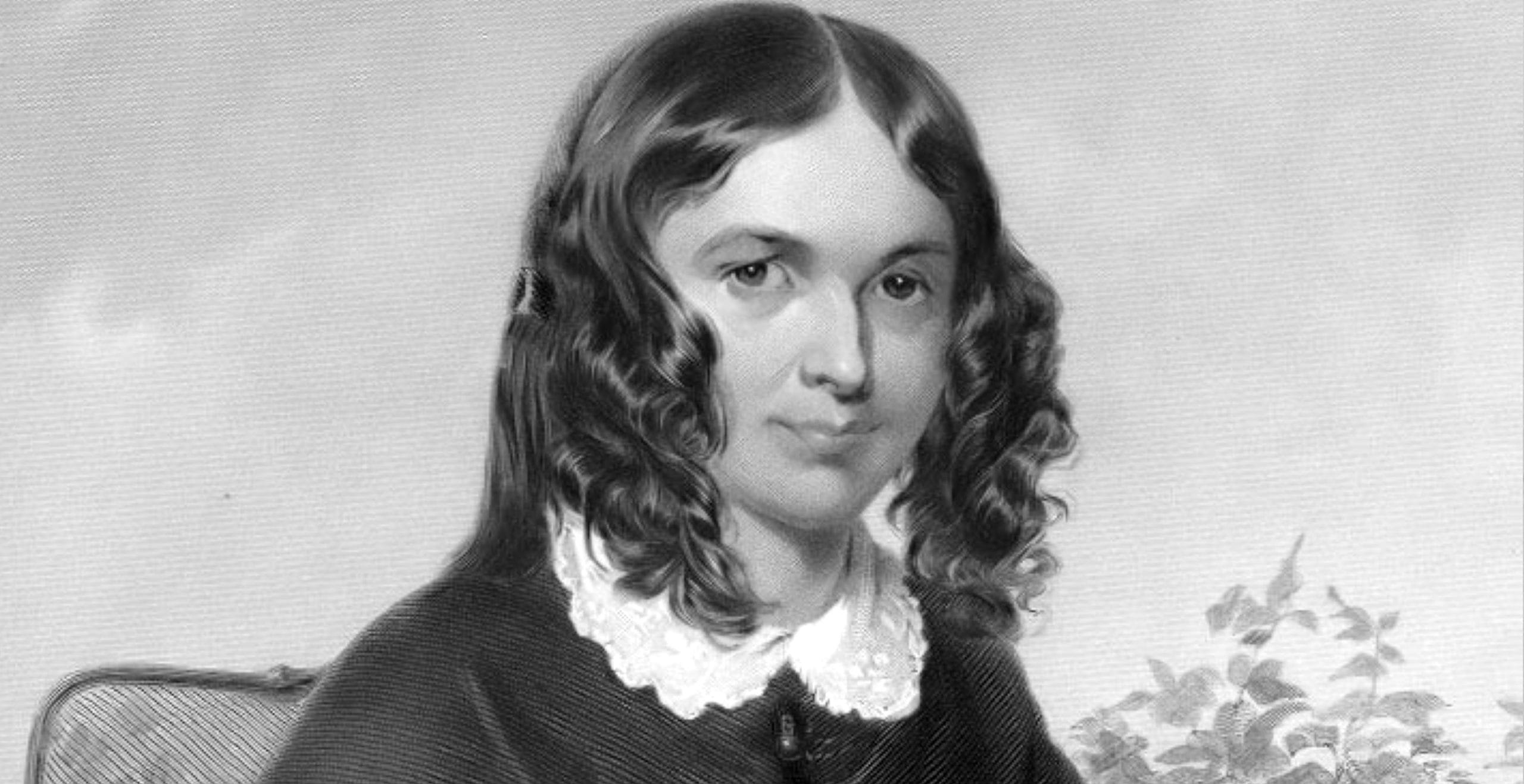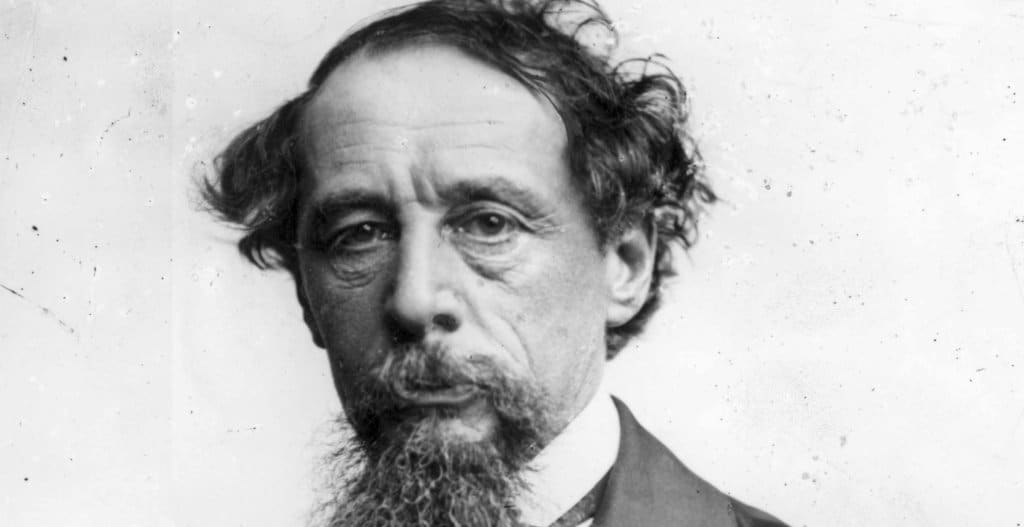Alfred, Lord Tennyson, was born in the village of Somersby in Lincolnshire to George Tennyson, a rector, and his wife Elizabeth on 6 August 1809, the third of their eleven surviving children.
Arguably one of the most famous English poets with a career lasting 62 years he not only became Lord Alfred 1st Baron Tennyson and succeeded Wordsworth as Poet Laureate in 1850, but was also a source of great comfort to Queen Victoria, following the death of Prince Albert in 1861. Indeed the Queen was quoted as saying that “Next to the Bible In Memoriam A.H.H (one of Tennyson’s most popular works) is my comfort”.
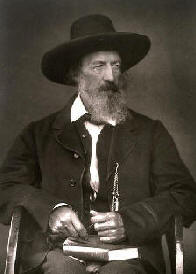 George Tennyson was both a scholar and poet himself, and provided Alfred with a sound knowledge of Latin and Greek, which was to provide the mythological influence for Alfred’s own attempts at poetry as a young boy and again in later life in poems such as Ulysses, the Greek Hero’s dramatic monologue. Having been disinherited by his own parents, George suffered from chronic depression and nervous disorders which were exacerbated by his heavy drinking and made him prone to violence. Several of Tennyson’s brothers followed in their father’s footsteps as his brother Arthur also drank heavily and his brother Edward was confined to a mental asylum in 1833. Given his family history it is not perhaps surprising that Tennyson had a life long fear and fascination of mental illness and its effects, and indeed Tennyson himself was prone to periods of depression and lethargy.
George Tennyson was both a scholar and poet himself, and provided Alfred with a sound knowledge of Latin and Greek, which was to provide the mythological influence for Alfred’s own attempts at poetry as a young boy and again in later life in poems such as Ulysses, the Greek Hero’s dramatic monologue. Having been disinherited by his own parents, George suffered from chronic depression and nervous disorders which were exacerbated by his heavy drinking and made him prone to violence. Several of Tennyson’s brothers followed in their father’s footsteps as his brother Arthur also drank heavily and his brother Edward was confined to a mental asylum in 1833. Given his family history it is not perhaps surprising that Tennyson had a life long fear and fascination of mental illness and its effects, and indeed Tennyson himself was prone to periods of depression and lethargy.
Tennyson attended Louth Grammar School in Lincolnshire between 1816 and 1820, before being educated at home by his father. In 1827, the same year that he entered Trinity College, Cambridge, and at only 17 years old, Tennyson published his first volume of poetry in collaboration with his brother Charles, entitled Poems by Two Brothers.
Whilst an undergraduate at Cambridge Tennyson went on to publish two further volumes entitled Poems, Chiefly Lyrical in 1830 and Poems in 1832, the latter being published after Tennyson left Cambridge without completing his degree. This was due, in part, to the death of his father in 1831 and the subsequent financial problems this caused.
It was at Cambridge that Tennyson met Arthur Henry Hallam, an Etonian and son of the famous Historian Henry Hallam, whose brief friendship was to become arguably the most important and intense relationship of Tennyson’s life and provide the inspiration for In Memoriam A.H.H.
Tennyson began the poem in 1833 as an outlet for his grief at the loss of his friend, when the twenty-two year old Hallam died suddenly and unexpectedly of a brain hemorrhage on 15 September that year, whilst on a trip to Vienna with is father.
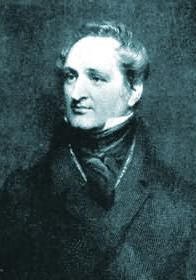 In Memoriam A.H.H, was undoubtedly a private tribute to Hallum, yet it was also quite clearly a social commentary on the world to which Tennyson belonged. It has been argued that the poem suggests a homosexual relationship between the pair, as Hallam is referred to as Tennyson’s “Dear heavenly friend that canst not die, Mine, mine, for ever, ever mine,” and “Thy creature, whom I found so fair” in the poem. Whilst Tennyson’s deep affection for his friend was no secret, it may be more prudent to read the poem from the prospective of the nineteenth century reader. For Tennyson’s contemporaries such intimate expressions of friendship were acceptable and common place, particularly in poetry.
In Memoriam A.H.H, was undoubtedly a private tribute to Hallum, yet it was also quite clearly a social commentary on the world to which Tennyson belonged. It has been argued that the poem suggests a homosexual relationship between the pair, as Hallam is referred to as Tennyson’s “Dear heavenly friend that canst not die, Mine, mine, for ever, ever mine,” and “Thy creature, whom I found so fair” in the poem. Whilst Tennyson’s deep affection for his friend was no secret, it may be more prudent to read the poem from the prospective of the nineteenth century reader. For Tennyson’s contemporaries such intimate expressions of friendship were acceptable and common place, particularly in poetry.
Perhaps then it would be best to view this poem in context with the period that it was written. The poems original title, The Way of the Soul, though in some ways less personal to the poet, emphasises not only Tennyson’s feelings as he comes to terms with his grief at the loss of Hallam, but also his way of wrestling with the big scientific-philosophical questions of the day.
In Tennyson’s lifetime, long-held religious and moral values which had previous been considered unquestionable fact, were now being undermined by the scientific discoveries and technology of the Industrial Revolution.
Perhaps becoming a product of his own time, Tennyson’s own self doubt led to a decade of silence in which, despite a burgeoning career in which he was likened to the Romantic poets Shelley, Byron and Keats in particular, he took his critics words to heart and became reluctant to publish any new volumes. Indeed it took him seventeen years to complete In Memoriam A.H.H. Tennyson’s personal life was not helped by this period of silence as his first love, Rosa Baring, with whom he fell in love in 1834, chose to marry a much wealthier man. Tennyson’s engagement to Emily Sellwood, sister to his Brother Charles’ wife Louisa, was also affected by his financial prospects which led to the engagement being suspended in 1840.
In 1842 the two-volume publication Poems, including new material and hugely improved revisions of earlier poems such as The Lady of Shallot received favourable reviews and made it clear that he was being taken seriously as one of the foremost poets of his generation. Tennyson’s popularity continued to grow and in 1850, the year that saw the publication of In Memoriam A.H.H, he was rewarded on both a personal and professional level, with his marriage to Emily, with whom he had two sons, Hallam and Lionel, and his appointment to the laureateship.
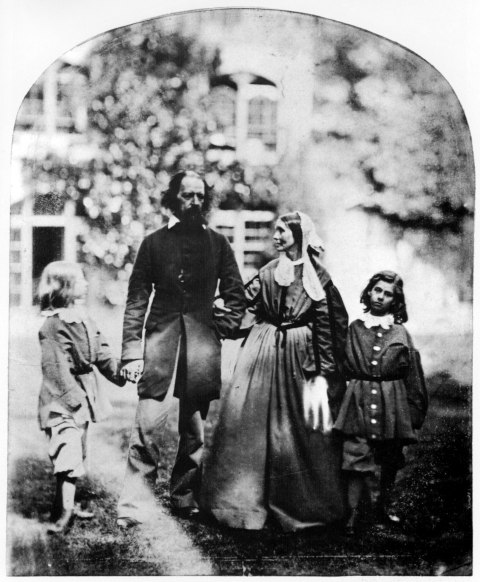
Alfred Tennyson, 1st Baron Tennyson with his wife Emily and his sons Hallam and Lionel.
In the second half of his life Tennyson’s fortune and popularity flourished as over the next forty years he produced many of his most popular works, such as Enoch Arden and The Charge of the Light Brigade and was awarded a barony in 1883, taking a seat in the House of Lords the year after.
Even today Tennyson’s work is still, perhaps unknowingly, part of popular culture. Lines such as “‘Tis better to have loved and lost, Than never to have loved at all.”” and “Their’s not to reason why, Their’s but to do or die” from In Memoriam A.H.H. and The Charge of the Light Brigade respectively, are still commonly used phrases in our modern vernacular. In fact in the Hollywood film Saving Private Ryan, the character Corporal Upham quotes the very same phrase from The Charge of the Light Brigade when discussing the search for the eponymous Private. The Iron Maiden song “The Trooper” is also heavily inspired by the same poem. Perhaps then it is unsurprising that Tennyson is the second most frequently quoted writer in The Oxford Dictionary of Quotations, with the first being, of course, William Shakespeare.
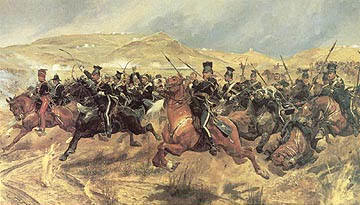
The Charge of the Light Brigade, Battle of Balaclava, painting by Richard Caton Woodville (1825-1855)
In 1889, at the request of Thomas Edison, Tennyson agreed to record some of his poems such as The Charge of the Light Brigade, and copies obtained from the original wax cylinders used by Edison are still, quite remarkably, usable today. You can listen to one of these early recordings of The Charge of the Light Brigade by following the link below:
The same year that Tennyson made these recordings his health began to fail as he became afflicted with a severe rheumatic illness. Alfred Tennyson passed away on 6 October 1892 and was buried in Westminster Abbey, leaving behind a legacy which is still, quite literally, being heard today.



